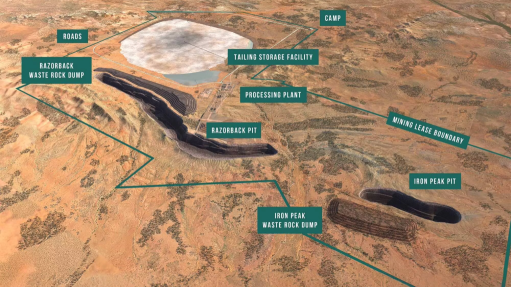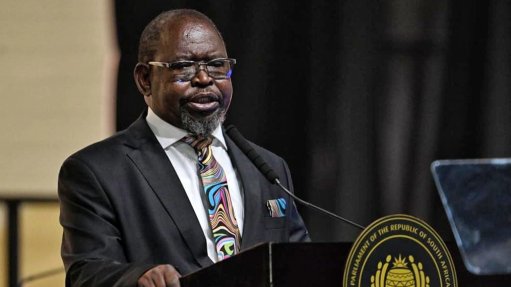Awareness of mining low among new engineers, but energy transition can prompt them to join industry – report
Engineering group Sandvik's 'The future of mining talent: What STEM graduates really think' report says that, while awareness of mining remains low among young engineers, many are open to joining the sector once they understand its modern realities and role in tackling the global energy transition.
While the global mining industry faces a growing shortage of engineering talent, this challenge could be turned into one of the sector's greatest opportunities, the report states.
Based on a survey of 824 STEM students and graduates across nine countries, nearly 40% of respondents are unfamiliar with mining, and a similar proportion cite this as a reason for not considering it as a career path.
However, the survey also shows a major opportunity for change, with more than 90% saying they would be more likely to consider a career in mining, if convinced that it contributes meaningfully to addressing climate change.
“The findings highlight a huge untapped opportunity for our industry. When young engineers understand that mining is not just about extraction, it's about tackling some of the world's most important challenges using digitalisation, automation and electrification, they see a sector where they can apply their skills to make a difference,” says Sandvik Group president and CEO Stefan Widing.
The shift toward a low-carbon, sustainable future relies on a secure, responsible supply of minerals and metals essential for clean energy, electric vehicles, advanced manufacturing and digital infrastructure, he says in the foreword to the report.
“Mining is not simply part of this transformation; it is its foundation. Without it, there is no electrification of society. Yet delivering on this opportunity will require more than process innovation or investment in new mining projects. It will require people with brilliant, driven and creative minds who can reimagine what mining can be.”
With almost half of the US mining workforce expected to retire by 2029 and engineering enrolments declining at multiple universities globally, the report calls for greater collaboration between companies, academia and policymakers to rebuild the talent pipeline through education, cultural change and evolution of industry perceptions.
This report is a call to action for industry to listen, to adapt and to connect more deeply with the next generation of innovators, by inspiring them with the scale of the challenge and showing them that a career in mining is a career that is shaping the future of our planet, Widing says.
“For me, the prospect of transforming an entire industry while making a critical contribution to the world’s energy transition is an engineering challenge of a lifetime,” he says.
“Mining offers the engineering challenge of a lifetime. The electrification of society will be powered by minerals, but it will be led by the next generation of minds bold enough to transform how we mine,” says Sandvik Group executive VP and human resources head Björn Axelsson.
The report also highlights the strongest motivators for new graduates, namely high salary potential, use of cutting-edge technologies and complex engineering challenges.
Conversely, safety concerns and perceptions of negative environmental impacts remain key deterrents, the report shows.
Meanwhile, many mining companies are automating their loading and hauling activities, introducing electrified fleets to reduce emissions and making these projects a central part of their communications efforts.
In Arizona, mining and metals company South32 is designing its Hermosa project to be its first next-generation mine. Hermosa comprises the Taylor zinc/lead/silver sulphide deposit and the Clark zinc/manganese/silver oxide deposit.
The operation will harness automation and battery-electric vehicles to drive efficiencies, minimise its environmental impact and achieve carbon-neutral status, the report points out.
Further, collaborations with universities and technology partners also show how academic research, automation expertise and field implementation can accelerate these types of projects.
For example, the Mechatronics Programme within Sandvik Academy is the result of a 12-month collaboration with a technical university in South Africa. The course integrates mechanical, electrical and software skills, to help mine technicians manage increasingly complex equipment.
CULTURAL CHANGE
The modernisation of mining requires cultural change, as well as technological innovation. Safety, accountability and diversity are now central to employer credibility, the report notes.
Technologies, such as automation and predictive analytics, have made mining significantly safer; however, these achievements often go unnoticed by the public.
Transparent and consistent reporting of safety performance and environmental data within the industry, and on the industry's culture, including lived and shared culture, are key factors in onboarding and retaining female engineers, the report recommends.
The mining sector’s contribution to society’s future and to the global energy transition depend on a workforce that is capable of designing and delivering safer, cleaner and smarter operations, the report states.
The challenge is positioning mining as a field that engineers consider vital to tackling the world’s most complex and consequential problems.
Additionally, because industries from technology to aerospace compete for science, technology, engineering and mathematics graduates, mining must offer something distinctive, such as the opportunity to apply innovation to overcome real-world social and sustainability challenges.
“The future of mining will be engineered by those who can see beyond extraction and recognise that progress in materials, technology and society are deeply connected.
“The green transition will be powered by minerals. However, it will be led by the next generation of minds who are bold enough to transform how we mine,” says Axelsson.
Article Enquiry
Email Article
Save Article
Feedback
To advertise email advertising@creamermedia.co.za or click here
Press Office
Announcements
What's On
Subscribe to improve your user experience...
Option 1 (equivalent of R125 a month):
Receive a weekly copy of Creamer Media's Engineering News & Mining Weekly magazine
(print copy for those in South Africa and e-magazine for those outside of South Africa)
Receive daily email newsletters
Access to full search results
Access archive of magazine back copies
Access to Projects in Progress
Access to ONE Research Report of your choice in PDF format
Option 2 (equivalent of R375 a month):
All benefits from Option 1
PLUS
Access to Creamer Media's Research Channel Africa for ALL Research Reports, in PDF format, on various industrial and mining sectors
including Electricity; Water; Energy Transition; Hydrogen; Roads, Rail and Ports; Coal; Gold; Platinum; Battery Metals; etc.
Already a subscriber?
Forgotten your password?
Receive weekly copy of Creamer Media's Engineering News & Mining Weekly magazine (print copy for those in South Africa and e-magazine for those outside of South Africa)
➕
Recieve daily email newsletters
➕
Access to full search results
➕
Access archive of magazine back copies
➕
Access to Projects in Progress
➕
Access to ONE Research Report of your choice in PDF format
RESEARCH CHANNEL AFRICA
R4500 (equivalent of R375 a month)
SUBSCRIBEAll benefits from Option 1
➕
Access to Creamer Media's Research Channel Africa for ALL Research Reports on various industrial and mining sectors, in PDF format, including on:
Electricity
➕
Water
➕
Energy Transition
➕
Hydrogen
➕
Roads, Rail and Ports
➕
Coal
➕
Gold
➕
Platinum
➕
Battery Metals
➕
etc.
Receive all benefits from Option 1 or Option 2 delivered to numerous people at your company
➕
Multiple User names and Passwords for simultaneous log-ins
➕
Intranet integration access to all in your organisation




















